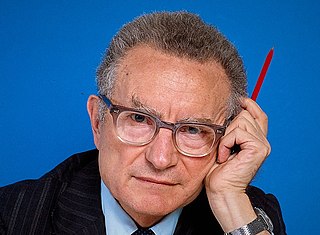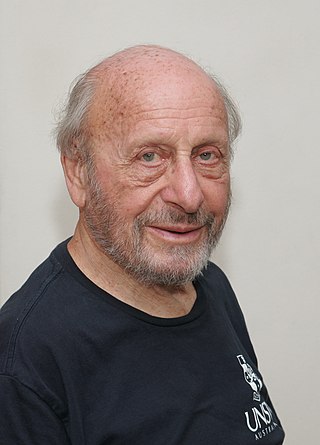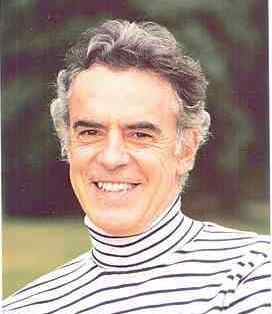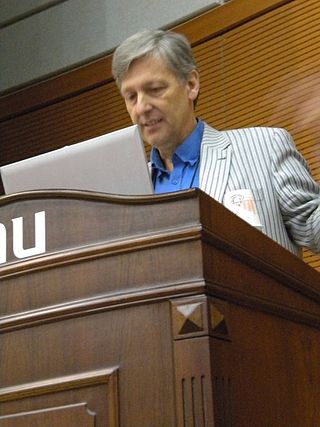
Post-Keynesian economics is a school of economic thought with its origins in The General Theory of John Maynard Keynes, with subsequent development influenced to a large degree by Michał Kalecki, Joan Robinson, Nicholas Kaldor, Sidney Weintraub, Paul Davidson, Piero Sraffa and Jan Kregel. Historian Robert Skidelsky argues that the post-Keynesian school has remained closest to the spirit of Keynes' original work. It is a heterodox approach to economics.

Paul Anthony Samuelson was an American economist who was the first American to win the Nobel Memorial Prize in Economic Sciences. When awarding the prize in 1970, the Swedish Royal Academies stated that he "has done more than any other contemporary economist to raise the level of scientific analysis in economic theory".

Karl Gunnar Myrdal was a Swedish economist and sociologist.
Maurice Herbert Dobb was an English economist at Cambridge University and a Fellow of Trinity College, Cambridge. He is remembered as one of the pre-eminent Marxist economists of the 20th century. Dobb was highly influential outside of economics, having helped to establish the Communist Party Historians Group which developed social history and attracted future members of the Cambridge Five to Marxism in the 1930s.
Alfred S. Eichner was an American post-Keynesian economist who challenged the neoclassical price mechanism and asserted that prices are not set through supply and demand but rather through mark-up pricing.

Heterodox economics is a broad, relative term referring to schools of economic thought which are not commonly perceived as belonging to mainstream economics. There is no absolute definition of what constitutes heterodox economic thought, as it is defined in constrast to the most prominent, influential or popular schools of thought in a given time and place.

Abraham "Abba" Ptachya Lerner was a Russian-born American-British economist.

Vladimer Papava is an Academician-Secretary of the Georgian National Academy of Sciences, a professor of economics at the Ivane Javakhishvili Tbilisi State University, the former Rector of the Ivane Javakhishvili Tbilisi State University, and the former Minister of Economy of Georgia.

The International Encyclopedia of the Social & Behavioral Sciences, originally edited by Neil J. Smelser and Paul B. Baltes, is a 26-volume work published by Elsevier. It has some 4,000 signed articles, and includes 150 biographical entries, 122,400 entries, and an extensive hierarchical subject index. It is also available in online editions. Contemporary Psychology described the work as "the largest corpus of knowledge about the social and behavioral sciences in existence." It was first published in 2001, with a 2nd edition published in 2015. The second edition is edited by James D. Wright.

Paul Davidson was an American macroeconomist who has been one of the leading spokesmen of the American branch of the post-Keynesian school in economics. He has actively intervened in important debates on economic policy from a position critical of mainstream economics.

The following outline is provided as an overview of and topical guide to economics:
Steven Pressman is an American economist. He is a former Professor of Economics and Finance at Monmouth University in West Long Branch, New Jersey. He has taught at the University of New Hampshire and Trinity College in Hartford, Connecticut.

Geoffrey Colin Harcourt was an Australian academic economist and leading member of the post-Keynesian school. He studied at the University of Melbourne and then at King's College, Cambridge.

David M. Gordon was an American economist and Professor of Economics at the Graduate Faculty of the New School for Social Research. He founded the Institute for Labor Education and Research in 1975 and later the Schwartz Center for Economic Policy Analysis in New York City. Gordon worked to disseminate progressive economic ideas to the general public and to contribute to the development of a left-political movement in the United States. Gordon's work dealt mainly with discrimination and labor market segmentation. He coined the term "social structure of accumulation", which gave rise to an extensive body of work on the impact of political, social and economic institutions on long-term investment and growth.

Marc Lavoie is a Canadian professor in economics at the University of Ottawa and a former Olympic fencing athlete.
Edward J. Nell is an American economist and a former professor at the New School for Social Research. Nell was a member of the New School faculty from 1969 to 2014. He achieved the rank of Malcolm B. Smith Professor of Economics in 1990.
William Breit (1933–2011) was an American economist, mystery novelist, and professional comedian. Breit was born in New Orleans. He received his undergraduate and master's degrees from the University of Texas and his Ph.D. from Michigan State University in 1961. He was an Assistant and associate professor of economics at Louisiana State University (1961–1965) On the recommendation of Milton Friedman he was interviewed and hired at the University of Virginia where he was Associate Professor and Professor of Economics (1965–1983). He returned to his San Antonio as the E.M. Stevens Distinguished Professor of Economics at Trinity University in 1983 and retired as the Vernon F. Taylor Distinguished Professor Emeritus in 2002. He is considered an expert in the history of economic thought and anti-trust economics. He established the Nobel Laureate Lecture Series at Trinity University and is most notable as a mystery novelist where their murder mysteries are solved by applying basic economic principles.
Frederic Sterling Lee was an American heterodox economist. His primary theoretical contribution to heterodox economics lies in the areas of pricing, price, production, costs, market competition, market governance, and the modeling of the economy as a disaggregated, emergent whole. He was the founding editor of the Heterodox Economics Newsletter (2004–09), the editor of the American Journal of Economics and Sociology (2009–13), the president of the Association for Institutional Thought (2012), the president of the Association for Evolutionary Economics (2015), and the founder and honorary life president of the Association for Heterodox Economics. Lee authored and edited seventeen books, including Post Keynesian Price Theory (1998), A History of Heterodox Economics (2009), and Microeconomic Theory: A Heterodox Approach (2017). He published fifty-six articles and over a hundred book chapters, book entries, book reviews, and notes of one sort or another.
Neva Goodwin Rockefeller is an American businesswoman. She's served as co-director of the Global Development And Environment Institute (GDAE) at Tufts University since 1993, where she is a research associate at the Fletcher School of Law and Diplomacy and director of the Social Science Library: Frontier Thinking in Sustainable Development and Human Well-Being.










